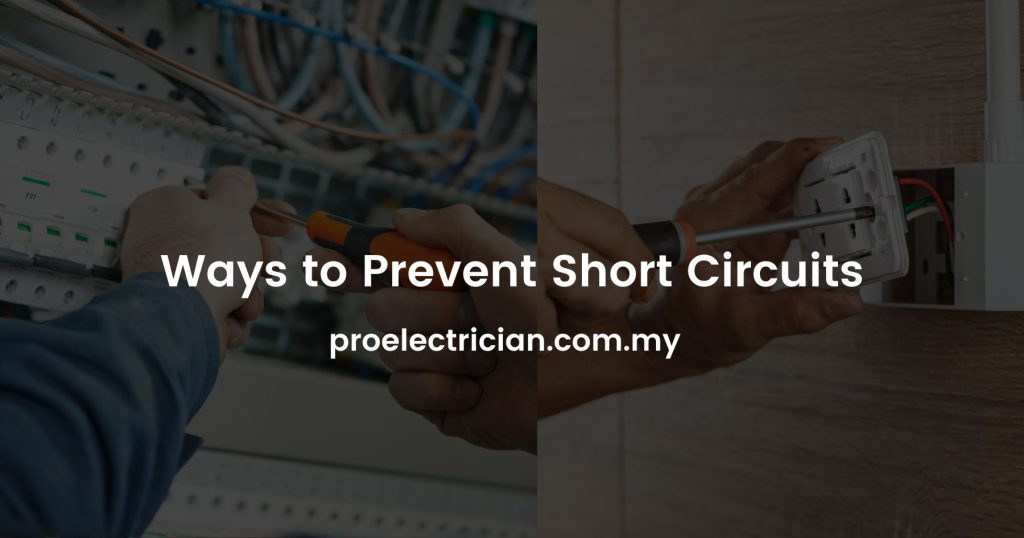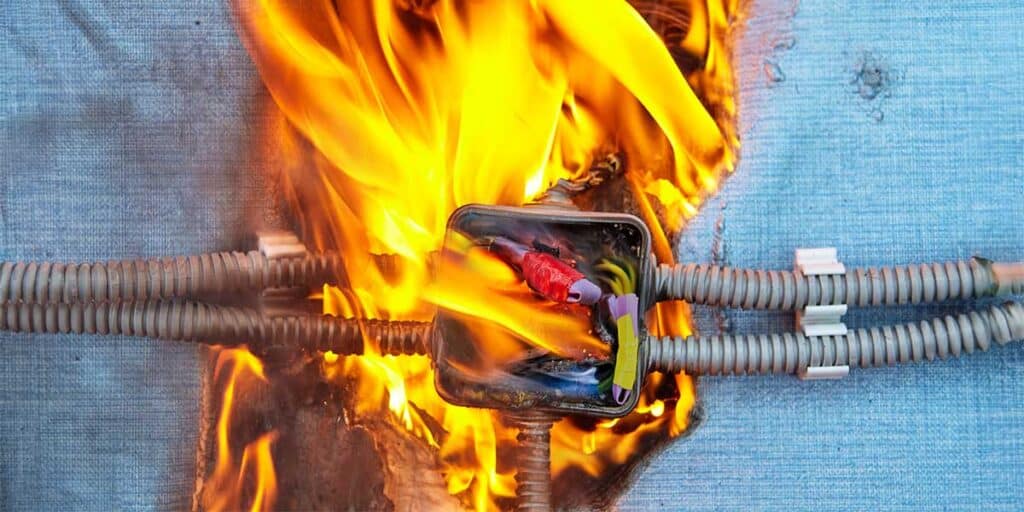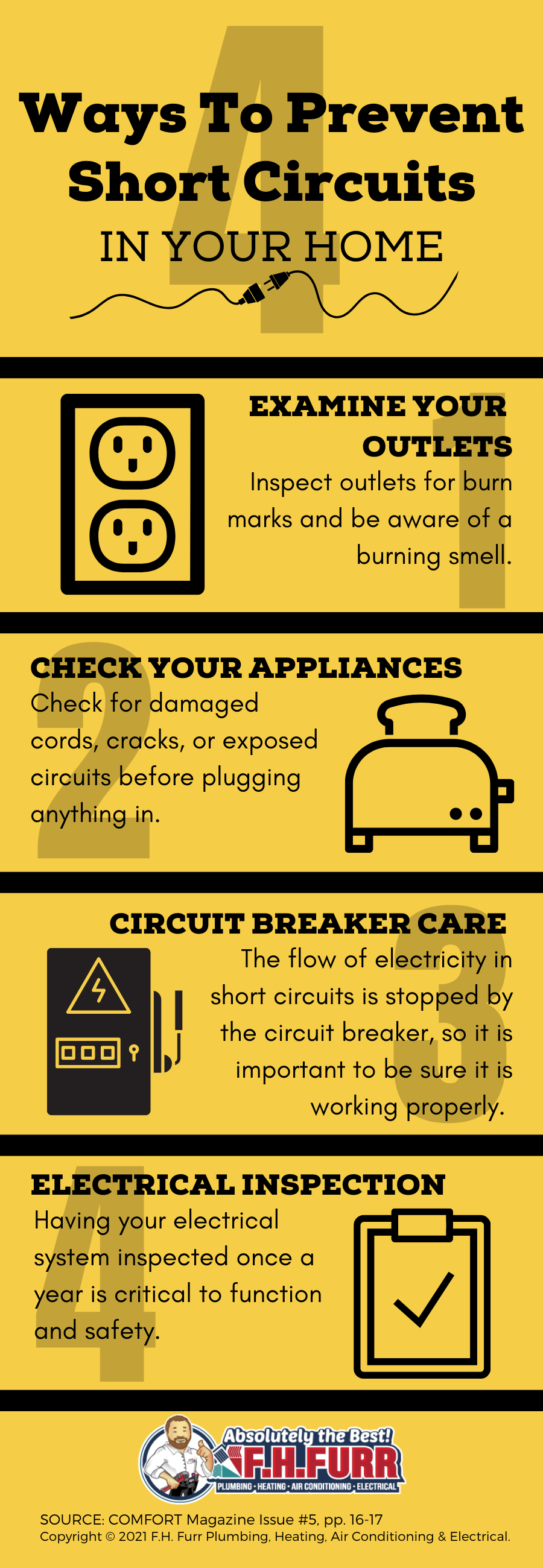Glory Tips About Can Short Circuit Be Prevented

Ways To Prevent Short Circuits Pro Electrician
Understanding Short Circuits
1. What Exactly Is a Short Circuit?
Imagine your electrical system as a carefully planned highway for electrons. They're supposed to flow along specific paths, powering your appliances and lighting up your home. A short circuit is like a detour where those electrons suddenly find a much shorter, easier route back to the source. This unplanned route offers very little resistance, causing a surge of current that can quickly lead to overheating and damage.
Think of it like a crowded concert. Everyone's trying to get to the stage, but suddenly a side door opens. A mad rush ensues, potentially causing a bottleneck, pushing, and general mayhem. In an electrical circuit, that "mayhem" can manifest as sparks, melted wires, or even a fire. It's definitely not a party you want to attend!
The key factor in a short circuit is the lack of resistance. Normal circuits have components that limit the flow of electricity, like resistors or the appliances themselves. These components act like speed bumps on our electron highway, preventing things from getting out of control. When those speed bumps are bypassed, things go downhill fast.
So, in a nutshell, a short circuit is an unintended, low-resistance pathway for electrical current, leading to a rapid and potentially dangerous surge. Now that we know what we're dealing with, let's explore how to prevent these electrical escapades.

Short Circuits Causes, Prevention, And Solutions Luminous Electric
Preventing Short Circuits
2. Regular Inspection
Just like your car needs regular check-ups, so does your home's electrical system. Pay attention to the warning signs. Are your outlets warm to the touch? Do your lights flicker mysteriously? Do you smell a faint burning odor coming from an outlet or appliance? These could be early indicators of a potential problem brewing.
Visually inspect your cords and plugs. Look for frayed wires, cracked insulation, or loose connections. These are all invitations for a short circuit to occur. If you spot any damage, don't hesitate to replace the cord or appliance. A little investment now can save you a lot of trouble (and potential fire damage) later.
Consider hiring a qualified electrician for a periodic electrical safety inspection, especially in older homes. They can identify hidden hazards and ensure your wiring is up to code. Think of it as an electrical wellness check. It may seem like an unnecessary expense, but it can provide peace of mind and potentially prevent a catastrophic event.
Remember, prevention is key. Being proactive and keeping a watchful eye on your electrical system can go a long way in preventing short circuits and keeping your home safe.

Addressing Common Causes of Short Circuits
3. Faulty Wiring
Old or damaged wiring is a major cause of short circuits. Over time, insulation can degrade, exposing bare wires. This can happen due to age, wear and tear, or even rodents nibbling on the wires (yes, it happens!). When these bare wires come into contact, a short circuit is almost inevitable.
Another wiring issue is improper installation. If wiring wasn't done correctly in the first place, it can create weak points in the system. Loose connections or wires that are too close together can eventually lead to a short circuit. That's why it's crucial to hire a qualified electrician for any wiring work.
Overloaded circuits also contribute to wiring problems. When you plug too many devices into a single circuit, you're essentially asking the wiring to handle more current than it's designed for. This can cause the wires to overheat and the insulation to break down over time, increasing the risk of a short circuit.
The solution? Regular inspections, proper installation by qualified professionals, and avoiding overloading circuits. Simple steps can help prevent faulty wiring from becoming a short circuit disaster.
4. Water and Electricity
Water is an excellent conductor of electricity. When water comes into contact with electrical components, it can create a path for current to flow where it shouldn't, leading to a short circuit. That's why it's so important to keep water away from electrical outlets and appliances.
Think about bathrooms and kitchens — areas where water is frequently used. Make sure outlets near sinks and showers are GFCI (Ground Fault Circuit Interrupter) protected. GFCIs are designed to quickly cut off power if they detect a ground fault, which can prevent a severe shock or fire. They are a lifesaver!
Also, be cautious about using electrical appliances near water. Never use a hairdryer near a sink full of water or operate an electrical device with wet hands. These seemingly harmless actions can have dangerous consequences.
Treat electricity and water like oil and water — they don't mix! By taking precautions to keep water away from electrical components, you can significantly reduce the risk of short circuits.

The Role of Circuit Breakers and Fuses
5. Circuit Breakers
Circuit breakers are safety devices designed to protect your electrical system from overloads and short circuits. They act like guardians, constantly monitoring the current flowing through a circuit. If the current exceeds a safe level, the circuit breaker trips, cutting off power to that circuit and preventing damage.
Think of a circuit breaker like a bouncer at a club. They're there to make sure things don't get too rowdy. If too many people try to get in at once, the bouncer steps in and stops the flow, preventing a crush. Similarly, a circuit breaker stops the flow of electricity when there's an overload or short circuit.
It's essential to know the location of your circuit breaker panel and how to reset a tripped breaker. Make sure the breaker is fully switched to the "off" position before switching it back to "on." If a breaker trips frequently, it could indicate a problem with the circuit that needs to be addressed by a qualified electrician.
Circuit breakers are an essential part of your home's electrical safety system. Understanding how they work and ensuring they're functioning properly can help prevent short circuits and protect your home from electrical fires.
6. Fuses
Fuses are similar to circuit breakers, but they use a different mechanism to protect against overcurrents. A fuse contains a thin wire that melts when the current exceeds a certain level, breaking the circuit and stopping the flow of electricity. Unlike circuit breakers, fuses are disposable; once they blow, they need to be replaced.
Think of a fuse as a sacrificial lamb. It's designed to sacrifice itself to protect the rest of the electrical system. When there's an overload or short circuit, the fuse blows, preventing damage to other components.
If you have fuses in your electrical panel, it's important to keep a supply of replacement fuses on hand. Make sure you replace a blown fuse with one of the same amperage rating. Using a fuse with a higher rating can be dangerous, as it may not provide adequate protection against overcurrents.
While circuit breakers are more common in modern homes, fuses are still found in older electrical systems. Understanding how fuses work and replacing them properly is essential for maintaining electrical safety.

Practical Tips for Preventing Short Circuits
7. Unplugging Appliances
When you're not using an appliance, especially high-power devices like hair dryers or space heaters, unplug it. This not only saves energy but also reduces the risk of a short circuit. Even when an appliance is turned off, it can still draw a small amount of power, and a faulty cord or internal component could still cause a short circuit.
It's also a good idea to unplug appliances during thunderstorms. Lightning strikes can cause power surges that can damage electronic devices, even if they're turned off. Unplugging them is a simple way to protect them from electrical damage.
When unplugging an appliance, always pull on the plug, not the cord. Pulling on the cord can damage the wiring and create a potential short circuit hazard. Treat your cords with care, and they'll last longer and be less likely to cause problems.
Unplugging appliances is a simple but effective way to prevent short circuits and save energy. It's a good habit to get into, especially when you're not using an appliance or when there's a risk of a power surge.
8. Extension Cords
Extension cords are convenient, but they can also be a source of short circuits if not used properly. Avoid using extension cords as a permanent wiring solution. If you need an outlet in a specific location, it's best to have a qualified electrician install one.
When using an extension cord, make sure it's rated for the amount of power the appliance will draw. Using an undersized extension cord can cause it to overheat, increasing the risk of a short circuit or fire. Also, avoid daisy-chaining extension cords together, as this can overload the circuit.
Inspect extension cords regularly for damage, such as frayed wires or cracked insulation. If you find any damage, replace the cord immediately. Don't try to repair it yourself; it's not worth the risk.
Use extension cords with caution, and only when necessary. If you need a permanent wiring solution, hire a qualified electrician to install one. This is a much safer and more reliable option than relying on extension cords.

WHAT IS A SHORT CIRCUIT, AND CAUSES ONE? YouTube
Frequently Asked Questions (FAQs)
9. Q
A: The very first thing you should do is immediately cut off the power. Locate the circuit breaker or fuse that controls the affected area and switch it off. This will prevent further damage and reduce the risk of fire or electric shock. After that, call a qualified electrician to investigate and repair the problem. Don't try to fix it yourself if you're not experienced in electrical work!
10. Q
A: Possibly! A frequently tripping circuit breaker is a red flag. It could indicate a short circuit, an overloaded circuit, or a faulty appliance. Unplug any appliances on that circuit and reset the breaker. If it trips again immediately, it's likely a short circuit or a wiring problem that needs professional attention. If it holds, try plugging in appliances one by one to see if one of them is the culprit.
11. Q
A: Yes, some appliances are more prone to causing short circuits than others, typically due to their high power consumption or the potential for damage to their cords. These include: space heaters, hair dryers, toasters, and any appliance with a damaged or frayed cord. Regular inspection and proper use are key to preventing issues with these appliances.